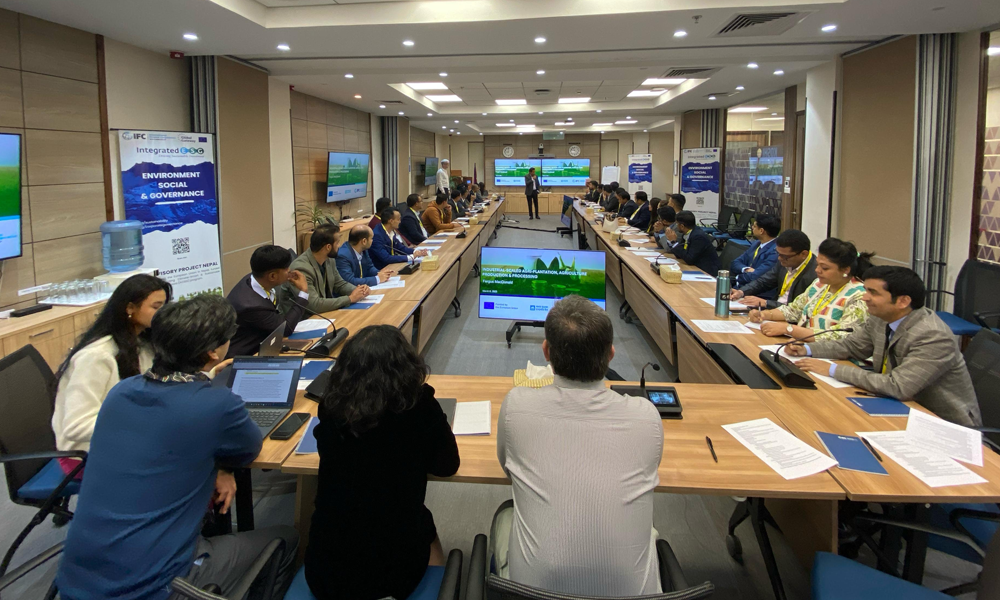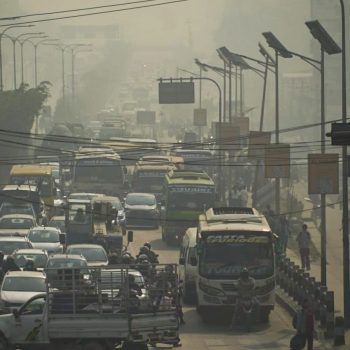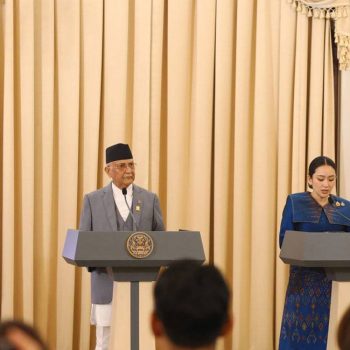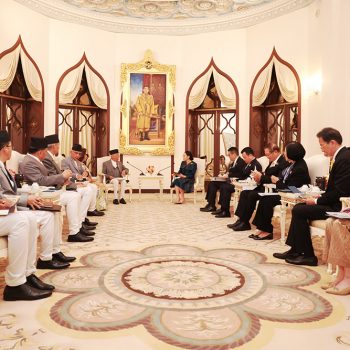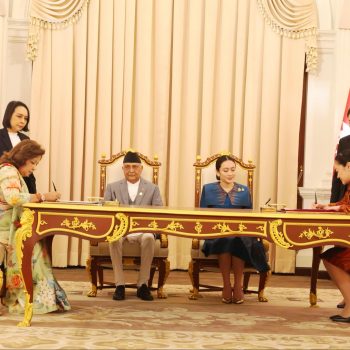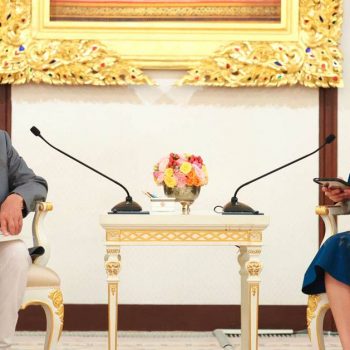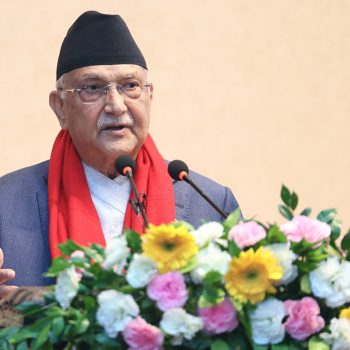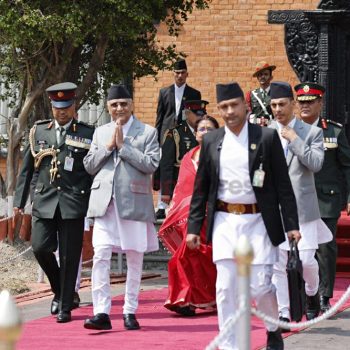A sugarcoated budget that will do little for the economy: Pro-Congress Economists
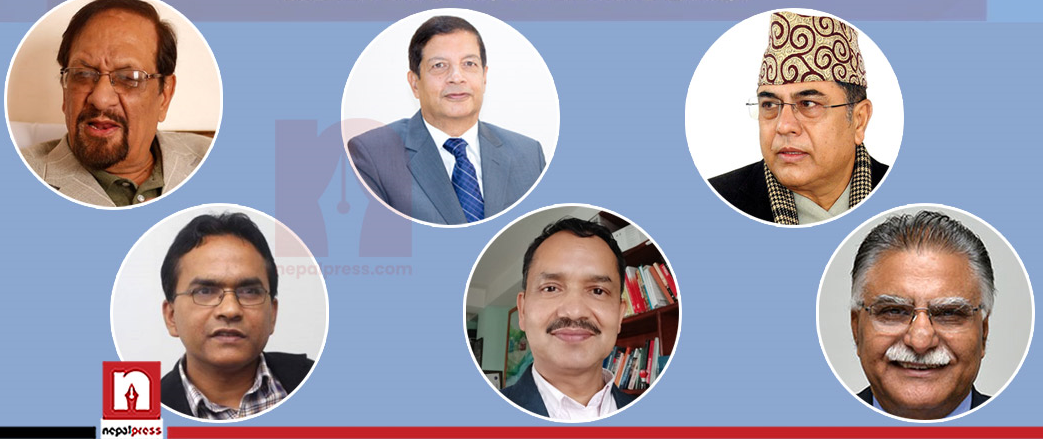
KATHMANDU: As soon as the budget of the Fiscal Year 2078/79 was made public, there were debates for and against it. It is natural for leaders of the political parties to be divided in their opinion towards the budget, but there is no consensus even among economists.
However, former finance ministers and economists close to the Congress, who were present at a program on Sunday, unanimously criticized the budget. At the budget review program organized by the Congress-led School of Democracy, they expressed a shared view that the budget was election-focused rather than oriented towards boosting the country’s economy. They also said that the implementation of the budget is challenging.
Former Finance Minister Ram Sharan Mahat, Former Governor Chiranjeevi Nepal, Former Vice Chairmen of the National Planning Commission Dr. Shakar Sharma, Prof. Dr. Govindraj Pokhrel, Dr. Jagadish Pokhrel and Economist Dr. Bishwa Poudel participated in the budget debate.
Nepali Congress leader and Former Finance Minister Dr. Mahat alleged that election-oriented programs were presented by increasing the size of the budget artificially. He said that the budget was against the constitutional procedure, values and norms.
“As the government has brought the budget in an improper manner, it will not be implemented in the future,” he said. “Only some of the programs in this budget will get continuity in the budget to be brought by the government that will be formed after the decision of the Supreme Court or after the elections.”
He also said that the budget targets were unnatural, as the budget target has been set by increasing the expenditure by 50% in an economy where even Rs 1100 billion cannot be spent.
“A distribution-oriented budget has been brought, allocating funds for the election and the cadres without ensuring resources,” Mahat said.
He said the government has set an overambitious target of 6.5% economic growth through the budget. He said that the economic growth was negative last year when the target was 8.5% and predicted that the current economic growth target of 7% would be limited to around 2% in reality.
Stating that the government has taken exorbitant external loans, Dr Mahat said “About six years ago, when I was Finance Minister, the public debt was 25.6%,” Mahat said. “Now, it has reached 40%. At that time, the per capita debt was 26,000, but this government has increased the debt to 52,000 per capita in four years.”
Mahat was outraged that social security allowances and salaries had been increased unnecessarily. He said that the law has been violated regarding the salary increase of the employees.
Economist and Former Vice-Chairman of the National Planning Commission Shankar Sharma said that the budget for the coming fiscal year was presented in a way that would push the targets of the 15th Plan further. He accused the government of changing Schedule 1 of the budget to hide the current expenditure.
“The presentation of this budget is different. Schedule 1 of the budget has been presented in a different way, by distorting the heading of current expenditure. The headings of expenses like salary, allowance, social security, etc. are not shown,” he said.
He also said that 90% of the current expenditure will be spent, but 80% of the capital expenditure will not be spent. Sharma said that when the entire share of revenue is spent on operating expenses, a need will arise to ask for loans for development activities.
“External loans and grants also do not appear to be in line with the budget targets. It seems the fact that not only Nepal but the world has been affected by COVID has not been considered. If this will be the context of expenditure and loans, we will reach a financially dangerous situation,” he said.
Sharma said that the reduction of supplementary and special grants to the province and local levels through the budget and the increase in conditional grants have raised questions over the autonomy of the local level.
“The central government is increasing the cost of conditional grants. As conditional grants increase, questions will be raised on the autonomy of the state government and the local level,” said Sharma.
He said Nepal is the largest spender in South Asia on old age and social security benefits. Stating that the government is very weak in terms of economy, Sharma said that it is difficult to achieve the 6.5% economic growth targeted through the budget.
Political ambitions dominant: Dr. Govinda Pokharel
Former Vice-Chairman of the National Planning Commission Prof. Dr Govinda Pokhrel said that there are both good and bad sides to the budget of the coming fiscal year. He said that good programs for employment generation have been brought in the 500-point budget presented by the Finance Minister for three hours.
Stating that the budget has touched on all issues, Pokharel pointed out that this itself is the weakness of the budget.
“Political ambitions are presented in the budget rather than the economic roles,” he said.
He criticized the budget for including things such as railways, tunnels, Chure conservation, and uranium. He claimed that the budget will not be implemented due to the inclusion of projects that could not be implemented such as the Prime Minister’s Employment Program, Prime Minister’s Agriculture Modernization Program, and Challenge Fund.
Pokharel says that the budget has gone beyond discipline as it will take more than a year to build the mechanism itself required to fulfill the ambitions taken by the budget.
“The expenditure and budget is brought as such to make it easier for the cadres. Politically, the opposition parties should try to control the budget expenditure by intervening and constantly giving warnings,” he said.
He objected to the 13% increase in the budget for the security apparatus.
“Why is the budget allocated for budget security higher than that for agriculture and energy?” He questioned.
Noting that this government alone has borrowed Rs 560 billion in loans, Porkhel said, “If the debt continues to grow at the same rate, it will reach 52% in the next two years.” It will take the country’s economy to a critical juncture,” he said.
Sugar-coated budget: Dr. Jagadish Chandra Pokharel
Former Vice-Chairman of the National Planning Commission, Jagdish Chandra Pokhrel, said that there was no room for error in the budget considering the expenditure and income of the budget and the format of the Ministry of Finance.
“Looking at the budget expenditure, income, and the party’s manifesto, there is no room for the common man to point errors on the budget,” he said.
According to Pokharel, the budget presented is weak from an economic point of view. He said that the budget is said to provide drinking water and electricity free of cost, but remains silent on capital formation.
“Even if the size of the budget is increased to increase current expenditure, the sources of income do not seem to reach the capital expenditure. The current expenditure will be 100% spent,” said Pokharel.
Pokharel warned that this would create a big challenge in the economy and make it difficult to handle the situation that will arise.
“This government did not bring a budget, it brought a manifesto, and it seems highly likely to bring disaster to the economy,” he said.
He says that even if it is said that foreign loans will also be a resource, if we look at past experiences, this is unlikely. He remarked that this government has not even been able to give policy continuity for the last four years. Pokharel remarks that this has been proven by the constant fluctuations done in the tax levied on electric vehicles.
“Yubaraj Khatiwada increased the tax on electric government vehicles by 120%, but the current finance minister has reduced it to 40%. We have to find an answer as to why this was done,” he said.
“From an economic point of view, it looks like sugar-coated,” Pokharel said.
Complexity in implementation: Dr Bishwa Poudel
Economist Dr Bishwa Poudel said that the implementation of the budget would be challenging. Poudel argues that questions will be raised upon the budget brought through an ordinance and the timing of budget presentation.
He said that this budget has not paid attention to the situations of not being able to spend the budget in the past. Poudel remarked that distribution-oriented and popular programs have been included by presenting a large budget.
He said that the budget of Rs 26 billion for the treatment, prevention, and control of COVID infection and purchase of vaccines was positive.
“A budget of Rs 26 billion has been allocated for COVID-19. Even if this is appropriate, the government should control corruption in the procurement of health products and vaccines,” said Poudel.
He says it is inappropriate to introduce programs in the forthcoming budget that provide free employment and do not create long-term wealth. He stressed the need to come up with employment-generating programs rather than these kinds of programs through the budget. Poudel said that people with low income did not get income tax reductions through this budget.
Poudel said that even this budget could not repeal the license system to register and run a private company. He said that due to this, real estate and foreign employment have greater chances of flourishing, rather than productive industries.
It is difficult to contain inflation at 6.5%: Dr. Chiranjeevi Nepal
Former Governor Dr. Chiranjeevi Nepal said that it was difficult to keep inflation within the limits set by the government. He said that inflation would increase as there would be pressure on the external sector due to the government’s target of raising Rs 250 billion internal debt through the budget.
“Domestic debt of 6% of the GDP is targeted to be raised, while the national debt raising law stipulates that no more than 5% can be raised,” he said, adding “This makes it difficult to keep inflation within the targets of the budget.”
Nepal said that if the parliament is reconstituted and another government is formed, the legitimacy of this budget will be questioned. He remarked that even though it is a political document, the government has presented this budget completely as a political document only.
“There is even a question mark over whether the current government can take ownership of the budget,” he said.




